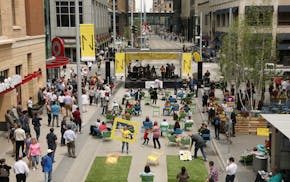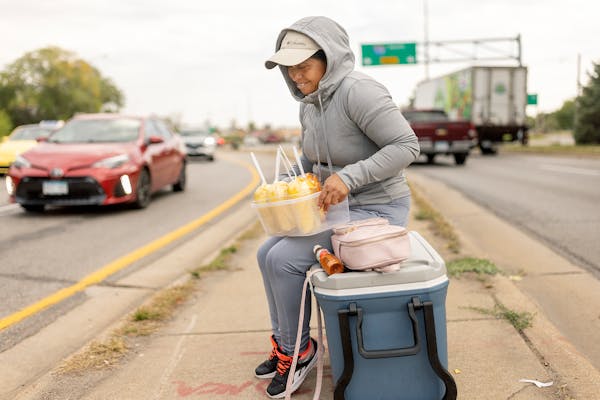More people — particularly recent immigrants — may soon be able to legally sell food and drinks from carts in Minneapolis.
The City Council voted 13-0 Thursday to loosen restrictions on where sidewalk cart vendors are allowed to sell, expanding it to a much broader area: the city's "goods and services corridor," an assemblage of streets across the city. The ordinance now goes to Mayor Jacob Frey, who is supportive of the measure.
The issue has become more pressing as the number of people selling food in city parks and on street corners has multiplied since the pandemic. Unlicensed vendors began appearing in Minneapolis in 2023, many of them asylum-seekers from Ecuador and Central America who don't yet have a permit to work legally in the U.S.
Most vendors have been concentrated in Powderhorn Park; Minnehaha Park; the Minneapolis Sculpture Garden; and along Hiawatha Avenue; Chicago Avenue and Lake Street; Bryant Avenue and Lake Street; and along Hennepin Avenue.
The nonprofit Minnesota Immigrant Movement did a survey and found most street vendors are women and make an average of $60 a day. Last year, the city saw an increase in unlicensed vendors, along with complaints about them. Dozens of people were cited for operating sidewalk food carts without a license, and seven unlicensed vendors were fined $200, with some repeat offenders racking up $3,000 in fines.
Inspectors are sometimes accompanied by police officers because vendors often resist giving their identities and sometimes are uncooperative or are with a large group. Jovita Morales, director of the Minnesota Immigrant Movement, told the Minnesota Star Tribune in October that some city inspectors have threatened vendors with deportation; city officials disputed that.
The vendors must use carts that store food at the proper temperature and make them eligible for a city license. City Council Member Jason Chavez said city staff will work with vendors to ensure their carts are compliant. There's still no license that would allow vendors to stand in medians or in traffic.
Council members Chavez and Aurin Chowdhury worked with the vendors for nearly two years to come up with the plan.
"I'm excited that these food carts are going to come all over our city to show the cultural food that we have in this city and making sure that more people have access to this delicious food," Chavez said.
Small vendors can apply for a license to sell in certain locations, which cannot be places where their cart would "substantially impair" pedestrians or vehicles or pose a hazard to public safety. They also cannot be adjacent to bus stops, taxi stands or handicap loading zones or be within 50 feet of intersections, three feet of curbs, or directly in front of store entries.
Frey said he's proud to support the ordinance, which "empowers new entrepreneurs, particularly immigrants and people of color, to grow their businesses and secure a better future for their families" while keeping "community health and safety at the forefront."
Chowdhury said the ordinance is a way to push back at a time when many people are feeling threatened and scared of the federal crackdown on immigrants.
"In this moment in time in our country, this is a glimmer of what we can be; how we can have progress as a way of resisting everything that's coming down and attacking the values of our community," she said.

Two Minneapolis protesters jailed, accused of assaulting officer after restaurant raid

Roper: Plentiful ideas to fix Nicollet Mall show it has a bright future

Fake texts are targeting Minnesota drivers for tickets. Here's what to know.

Gov. Tim Walz confronts rift with labor allies as he mulls third term

